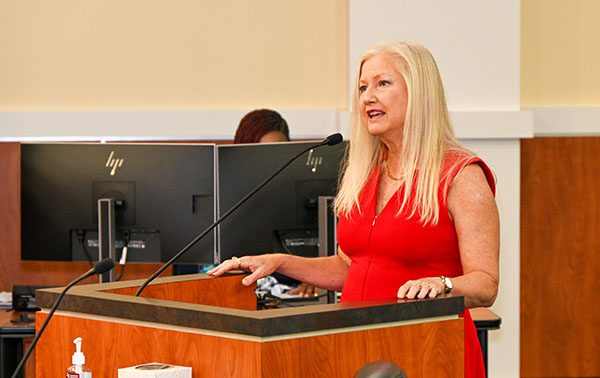
While the basic property tax rates will not change in the Village of Wellington, that won’t totally spare residents from opening their wallets a bit wider when the new fiscal year begins Oct. 1 because home values increased and some costs for utilities and services are going up.
Budget details were unveiled at the Wellington Village Council meeting Tuesday, June 24, by way of a presentation on the fiscal year 2026 budget from Deputy Village Manager Tanya Quickel.
Final numbers will not be formally adopted until further meetings in coming months, but it’s likely that water bills from the village-run utility will increase by the third of three annual 10 percent increases.
That translates to an average of $8.26 more per monthly water bill for each residential customer, Quickel said, coming out to $99.12 more for the year.
These increases are driven by continued operations, maintenance and construction project increases, and environmental mandates for lead in water and forever chemicals, according to a village statement on the budget.
Some relief could lie a year ahead, when water bills revert to an increase of 3.5 percent, or an amount tied to an official government inflation rate, whichever is higher.
One way that residents may pay a little more even if their tax rate is unchanged is by a rise in their taxable property values.
For a resident with a $450,000 home, that’s expected to mean about $32 more for a property that is homesteaded, meaning there are limits on how much taxes can go up in any given year. The increase will look more like $111 for a $450,000 non-homesteaded property.
Councilman John McGovern said rising property values signal good things about a desirable place to live. “It’s a sign of success,” he said.
The council voted 5-0 for resolutions backing key components of the budget.
The ad valorem property tax rate remains at 2.47 mills, the same average for the last 17 years. For the last 13 of those years, property values in the village have increased annually.
Taken together, it’s a state of affairs that is helping Wellington avoid a rate hike while reaping a 6.3 percent increase in taxable value to support cost increases for services in the coming year.
Wellington’s overall budget will increase to $156 million, a 4.5 percent increase.
What costs are rising? The budget includes a two percent increase in the Palm Beach County Sheriff’s Office contract and the addition of a new sergeant to support community policing and safety.
An Acme Improvement District assessment related to drainage and stormwater management will increase to $275 per unit, up $20 from the previous year.
Solid waste fees, discussed at a prior meeting, will bump up $10 to $320 curbside and $5 to $235 for containers.
In other business:
- State Rep. Anne Gerwig (R-District 93), the former mayor of Wellington, briefed former colleagues on her first legislative session. Her remarks began with a gentle jibe after the village agenda listed her as “Ann Gerwig.”
“It is great to be home, where everybody knows my name, just not how to spell it,” she said.
Among other things, she discussed measures where she was a sponsor or played an active role, from a bill promoting fentanyl awareness to legislation that lets school districts opt out of mandated later start times for high school and middle school students. The well-intended effort to let older students get more sleep by 2026 would have interfered with after-school schedules and much more, she said.
“I want to thank you for that,” Councilwoman Amanda Silvestri said. “That was going to be a nightmare for our parents.”
- By a 4-1 vote, the council approved the second and final reading of a plan to put before local voters changes in the village charter related to municipal election rules that Wellington has already carried out in practice for years.
One would set the qualifying period for local candidates at two weeks in November, and another would modify how Wellington selects its own election canvassing board in the rare event it is needed in place of a Palm Beach County board that would likely fill that role.
The dissenter was Mayor Michael Napoleone. He was worried that voters won’t understand what they are being asked to approve, and the council can just continue to hold its own votes to achieve the same effect.
“I don’t want to do this,” Napoleone explained. “I think it becomes more confusing than it’s worth.”
- By a unanimous vote, the council agreed to increase pay for special magistrates to hear appeals of code violations from $165 per hour to $200 per hour, and to pave the way for changes in the roster of magistrates that the village uses. Magistrates could see an increased workload if there are significant numbers of challenges to fines from new school speed-zone cameras in the fall.







